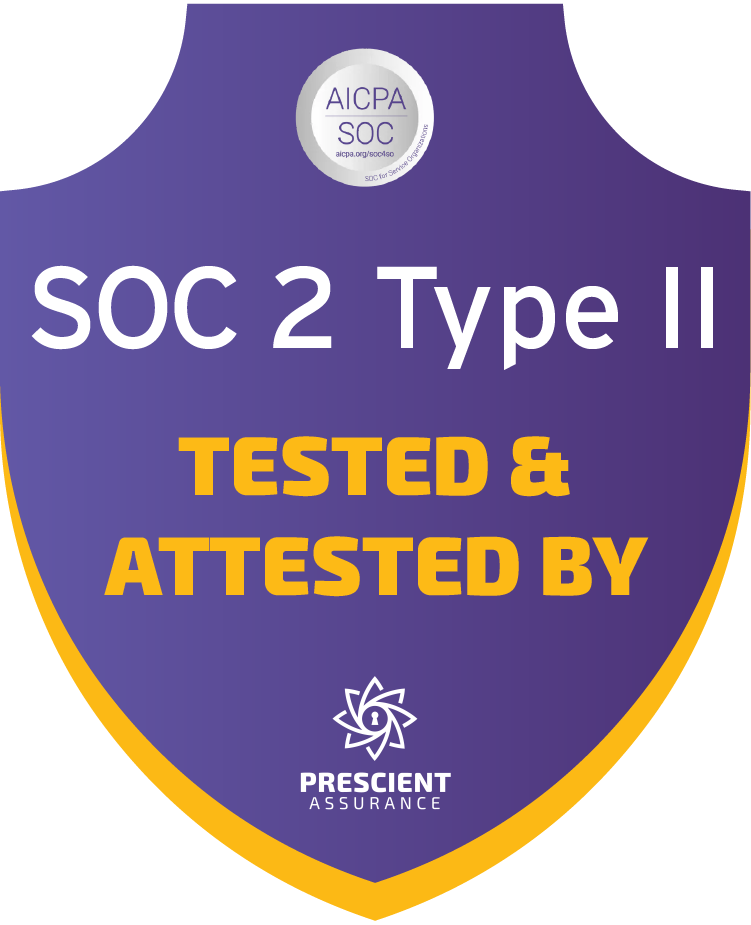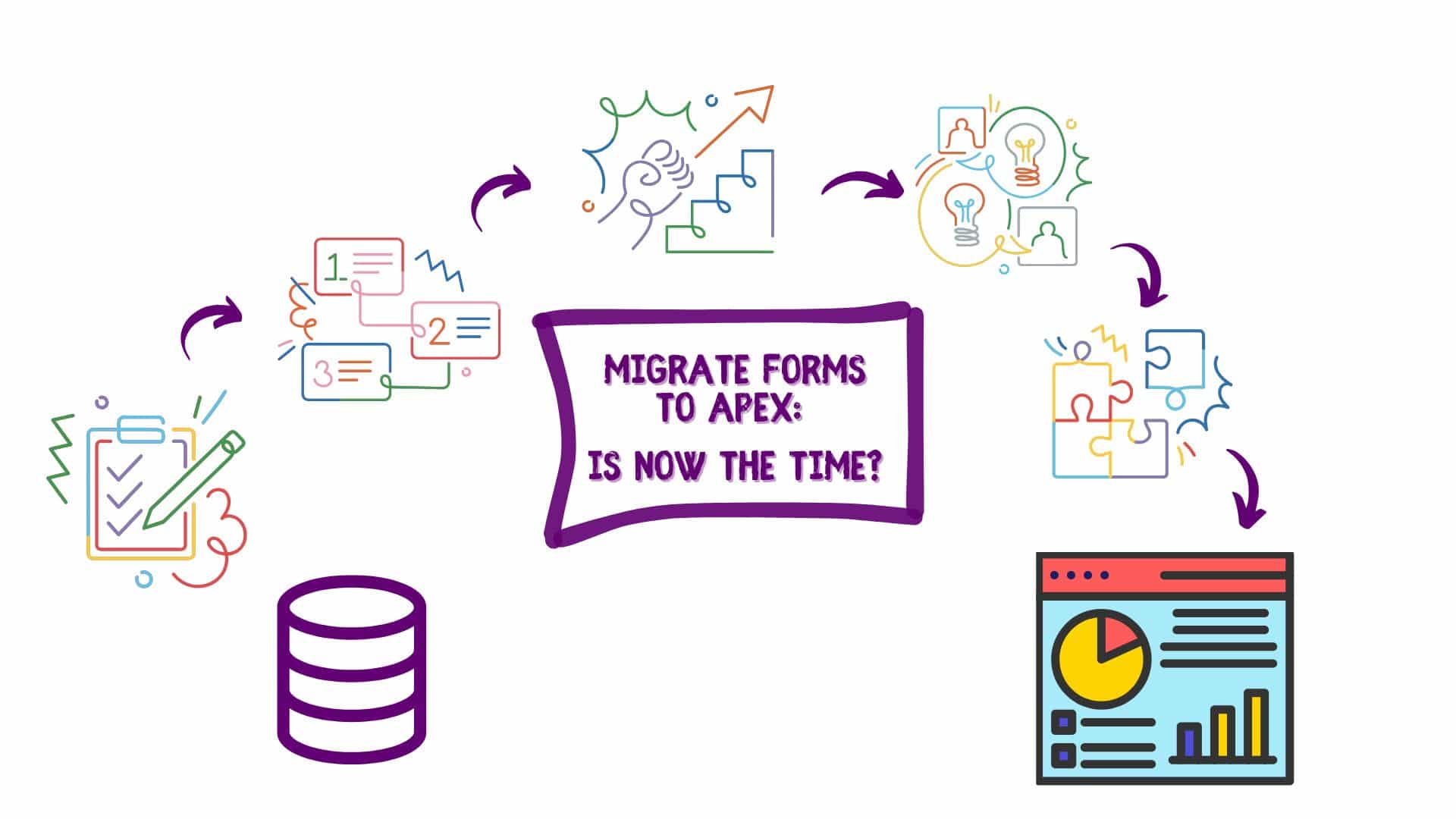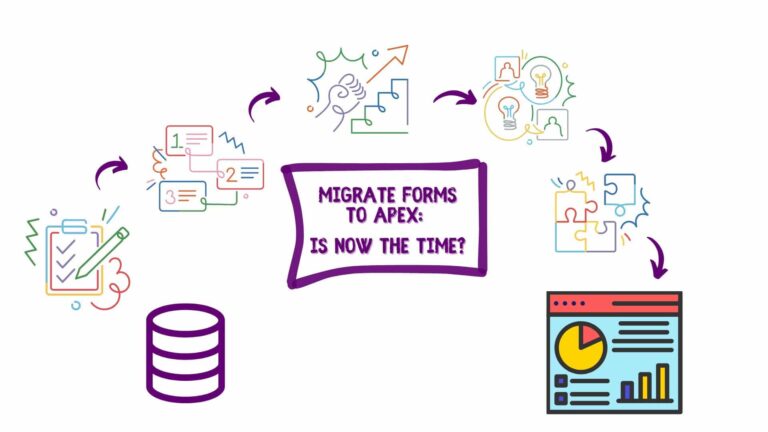You find yourself at a crossroads – your trusted Oracle Forms applications, while familiar, feel increasingly outdated in our fast-paced technological landscape. You’ve heard whispers of Oracle Application Express – a modern, low-code development platform that promises an enhanced user interface and streamlined development. But how do you migrate Oracle Forms to Oracle APEX and is it the right move for your organization?
This isn’t about jumping on the newest tech bandwagon. This is about making strategic decisions to future-proof your business applications. Let’s unpack the compelling reasons why you may want to migrate Oracle Forms to Oracle APEX and why it might be the strategic advantage you’ve been seeking.
Why Migrate Oracle Forms to Oracle APEX?
Oracle Forms has been a reliable workhorse for decades. However, technology marches forward, and what was once cutting-edge can become a hurdle in today’s digital environment. Oracle itself acknowledges this shift by focusing on newer technologies like Oracle Application Express.
With Google Chrome phasing out support for Java applets, the writing is on the wall. This decision signifies a broader industry trend moving away from outdated technologies. Other browsers may soon follow suit, leaving Oracle Forms applications in a precarious position.
Advantages of Oracle APEX: Breathing New Life into Legacy Applications
Imagine this – a platform that empowers you to build modern, feature-rich web applications without the burden of complex coding and that can be easily adopted by your current development team. This is the promise of Oracle APEX. Let’s explore the key advantages of transitioning Oracle Forms to this agile platform:
| Feature | Oracle Forms | Oracle APEX |
|---|---|---|
| User Interface | Outdated, client-server based | Modern, responsive web interface |
| Development Speed | Traditional coding, time-consuming | Low-code environment, faster development cycles |
| Deployment | Often requires on-premise infrastructure | Cloud-native, flexible deployment options |
| Cost | Can involve high licensing and maintenance costs | Leverages existing Oracle Database licenses, potential cost savings |
The table above highlights how a move from Oracle Forms to Oracle APEX brings your applications into the modern era. It’s not just a facelift but a complete rejuvenation. You’re switching from a system that feels clunky and restrictive to one that is sleek, intuitive, and brimming with possibilities.
Unlocking Business Agility with Oracle APEX: A Real-World Example
Let’s move beyond theoretical benefits and ground this discussion with a real-world success story. Consider the experience of a prominent European logistics company grappling with an aging Oracle Forms-based system.
They faced challenges in integrating with modern freight management systems, leveraging AI, and providing a seamless user experience for employees accustomed to today’s intuitive applications. Their outdated system was holding them back from innovations that could revolutionize their operations.
This company made the strategic decision to
migrate Oracle Forms to Oracle APEX. The outcome? A cloud-based system accessible from any device, streamlined integration with AI-powered freight management, and substantial reductions in licensing and operational costs.
Navigating the Migration: Addressing Common Concerns
Change, even when promising a brighter future, can feel daunting. You’re right to have questions. Let’s address some common concerns regarding transitioning Oracle Forms:
“My Team Has Used Oracle Forms For Years. Will This Transition Be Too Disruptive?”
This is a valid concern. Change management is crucial for any successful technology migration. The key is to approach it strategically:
- Highlight similarities: Oracle Application Express uses the same familiar PL/SQL packages your team is proficient with, easing the learning curve for your team.
- Provide adequate training: The learning curve for your team is relatively quick. DesTech can provide the training tailored to your team to ensure a smooth transition to APEX applications development.
- Emphasize the benefits: Clearly communicate how this migration makes their jobs easier and opens up new opportunities for innovation. Your team’s current skills are still relevant and are simply enhanced by an easier and more productive development tool.
“How Complex and Costly Will This Migration Be?”
The complexity and cost depend on the size and complexity of your existing applications. A phased approach, migrating modules incrementally, can mitigate disruption and provide early wins to build momentum. It’s essential to consult with experienced Oracle APEX professionals to accurately assess your specific needs and develop a tailored migration plan.
Conclusion
The decision to migrate Oracle Forms to Oracle APEX isn’t simply about staying ahead of the curve; it’s about embracing a future where your business applications are agile, adaptable, and primed for innovation. This is about harnessing modern web application technologies to enhance efficiency, boost productivity, and unlock new levels of growth for your organization. The choice is clear – embrace the future of application development with Oracle Application Express.
Migrating Oracle Forms to Oracle APEX is not merely a technology upgrade; it represents a strategic move to future-proof your organization. By embracing the power of low-code development, cloud computing, and a modern user experience, you unlock the potential for enhanced agility, cost savings, and greater business value.
As technology continues its rapid evolution, the ability to adapt and innovate will be paramount. The decision to migrate from Oracle Forms to Oracle Application Express is a step towards ensuring your business applications are not just keeping up, but thriving in the digital age.




